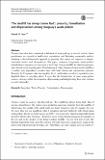Files in this item
'The landfill has always borne fruit' : precarity, formalisation and dispossession among Uruguay's waste pickers
Item metadata
| dc.contributor.author | O'Hare, Patrick | |
| dc.date.accessioned | 2020-05-13T14:30:03Z | |
| dc.date.available | 2020-05-13T14:30:03Z | |
| dc.date.issued | 2019-03-05 | |
| dc.identifier | 267902777 | |
| dc.identifier | 0b8bd814-0114-410f-8299-392344b850bd | |
| dc.identifier | 85056193583 | |
| dc.identifier.citation | O'Hare , P 2019 , ' 'The landfill has always borne fruit' : precarity, formalisation and dispossession among Uruguay's waste pickers ' , Dialectical Anthropology , vol. 43 , no. 1 , pp. 31-44 . https://doi.org/10.1007/s10624-018-9533-6 | en |
| dc.identifier.issn | 0304-4092 | |
| dc.identifier.other | ORCID: /0000-0003-2535-2881/work/74118211 | |
| dc.identifier.uri | https://hdl.handle.net/10023/19932 | |
| dc.description | This research was funded by an ESRC doctoral studentship, based at the University of Cambridge. | en |
| dc.description.abstract | Precarity has often been considered a hallmark of waste-picking, a survival activity whose practitioners are exposed to health risks, exploitation and fluctuating commodity markets. Adopting a three-dimensional approach to precarity that centres on 'exposure to danger', 'uncertain tenure' and 'dependence', this paper compares Uruguayan waste-pickers' (clasificadores) experiences of precarity at the Felipe Cardoso landfill, its related cooperative, and a formal sector recycling plant. Clasificadores at Felipe Cardoso characterise the landfill as a 'mother' who dependably provides them with food, clothes and construction materials. Recently, the Uruguayan state has sought to divert clasificadores to what is regarded as more dignified labour in recycling plants. I argue that the formalisation of some waste-pickers creates a cleavage within the occupation, dispossessing and delegitimising those who continue to work 'informally'. | |
| dc.format.extent | 14 | |
| dc.format.extent | 459511 | |
| dc.language.iso | eng | |
| dc.relation.ispartof | Dialectical Anthropology | en |
| dc.subject | Recycling | en |
| dc.subject | Waste | en |
| dc.subject | Precarity | en |
| dc.subject | Formalisation | en |
| dc.subject | Dispossession | en |
| dc.subject | GN Anthropology | en |
| dc.subject | T-NDAS | en |
| dc.subject | SDG 3 - Good Health and Well-being | en |
| dc.subject.lcc | GN | en |
| dc.title | 'The landfill has always borne fruit' : precarity, formalisation and dispossession among Uruguay's waste pickers | en |
| dc.type | Journal article | en |
| dc.contributor.institution | University of St Andrews. Social Anthropology | en |
| dc.identifier.doi | https://doi.org/10.1007/s10624-018-9533-6 | |
| dc.description.status | Peer reviewed | en |
This item appears in the following Collection(s)
Items in the St Andrews Research Repository are protected by copyright, with all rights reserved, unless otherwise indicated.

